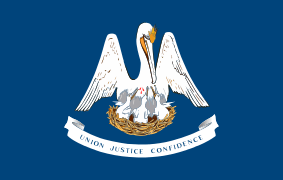Michael Hahn
| Michael Hahn | |
|---|---|
 | |
| 19th Governor of Louisiana | |
| In office March 4, 1864 – March 4, 1865 | |
| Lieutenant | James M. Wells |
| Preceded by | Henry Watkins Allen (Confederate Governor) George F. Shepley |
| Succeeded by | James M. Wells |
| Member of the U. S. House of Representatives from Louisiana's 2nd district | |
| In office December 3, 1862 – March 4, 1863 | |
| Preceded by | Miles Taylor |
| Succeeded by | James Mann |
| Member of the U. S. House of Representatives from Louisiana's 2nd district | |
| In office March 4, 1885 – March 15, 1886 | |
| Preceded by | Ezekiel John Ellis |
| Succeeded by | Nathaniel Dick Wallace |
| Personal details | |
| Born | November 24, 1830 Klingenmünster, Rhineland-Palatinate |
| Died | March 15, 1886 (aged 55) Washington, DC |
| Political party | Republican |
| Spouse(s) | Unmarried |
| Alma mater | Tulane University |
George Michael Decker Hahn (November 24, 1830 – March 15, 1886) was the 19th Governor of Louisiana and Congressman during Reconstruction and after.
Early life
Hahn was born in Klingenmünster, Rhineland-Palatinate, Germany, Hahn was born to a widow.[1][2] Some sources indicate that Hahn's parents were Jewish,[3] and the Encyclopedia Judaica describes him as "the first Jewish governor in the U.S."[4] The Louisiana Secretary of State website lists Hahn's religion as Episcopalian.[5]
With his mother and 4 siblings, the family immigrated to New York and then to the Republic of Texas, before arriving in New Orleans in 1840; the following year his mother died of yellow fever.[1] Hahn graduated from City High School and in 1849, began reading law under Christian Roselius, a prominent Whig attorney and later Attorney General of Louisiana.[1]
Political career
In 1851, Hahn graduated from the University of Louisiana (Tulane University) and the following year he was elected to the city school board at the age of 22; he ran the school system as its director. He joined the Democratic party faction led by Pierre Soulé and, in the Presidential Election of 1860, Hahn supported Stephen Douglas.[1]
Hahn became a vocal activist in 1860 against the prevailing Southern view and delivered a pro-Union speech in Lafayette Square. He would avoid taking an oath of allegiance to the Confederacy. An adherent of the Union, Hahn became the U.S. Representative from Louisiana's 2nd congressional district in 1862. Hahn was one of two Louisiana Representatives seated in the 37th Congress which adjourned on March 4, 1863.[1] Eventually, Hahn advised that there should be no more representation from Louisiana until it was reconstructed. During his time in Washington, Hahn met and befriended President Abraham Lincoln.[6]
Term as governor
In 1864, with almost all of Louisiana under federal occupation, General Nathaniel P. Banks, the Union Military Commander of the Department of the Gulf (responsible, among other things, for civil order in occupied Louisiana) called state elections and convened a constitutional convention. Benjamin Franklin Flanders and Thomas Jefferson Durant, prominent and radical Unionists, opposed the moderate plan called for by General Banks. Hahn purchased a pro-slavery newspaper, the New Orleans True Delta and converted it to moderate Unionism supporting Banks' plan.[6] Hahn also ran for Governor as a moderate Republican and won the election with 54% or 11,411 votes. J. Q. A. Fellows, a conservative received 26% or 2,996 votes and Benjamin Franklin Flanders, the radical Republican received 20% or 2,232 votes.
Hahn became the first German-born governor of an American state.[7]

On March 4, 1864, Hahn was inaugurated as Governor of Union-held Louisiana in an elaborate ceremony paid for by General Banks.[8] As governor, Hahn supported universal education.[9] In his term, he tried to provide blacks with the ability to vote but was only able to oversee the adoption of the 15th Amendment. Hahn's administration made serious attempts at ensuring enfranchisement of black Louisianans, laid the foundation for a public school system for blacks, and began an aborted Reconstruction in Louisiana. Governor Hahn played a leading role in the state constitutional convention of 1864, but he was opposed by Major General Stephen A. Hurlbut who replaced Banks as commander of the Department of the Gulf. General Hurlburt refused to recognize the civil government of Hahn. So, Hahn ran for and was elected to the U.S. Senate in 1865.[6] However, Radical Republicans did not seat him.[10]
On March 3, 1865, Governor Hahn resigned and his Lieutenant Governor James Madison Wells succeeded him.[11]
Political editor and congressman
After President Lincoln was assassinated in April, 1865, Congress refused to seat any Representatives or Senators from the South until a reconstruction plan could be carried out. Senator-elect Hahn returned to New Orleans and allied himself with radical Republicans calling for a convention to revise Louisiana's Constitution of 1864 to include black suffrage. This led to his almost being killed on July 30, 1866, during a New Orleans Police riot.[1]
Hahn subsequently became editor and manager of the New Orleans Republican newspaper, and in 1872 he moved to a plantation in St. Charles Parish and established the village of Hahnville, where he published the St. Charles Herald.[1] On his plantation, he grew sugar cane.[12]
From 1871 to 1878 Hahn served in the Louisiana State Legislature. There he served as Chairman of the Judiciary Committee and Speaker of the House. He was appointed Superintendent of the U.S. Mint in 1878, serving until January 1879. At that point, Hahn was appointed Judge of the 26th state judicial district, which included Saint John the Baptist, Saint Charles, and Jefferson parishes. In the 1880 elections, Hahn established and edited the New Orleans Ledger to promote Republican candidates, and in 1884 Hahn was elected to Congress as the Republican candidate for Louisiana's 2nd congressional district – a race which he won by 1,300 votes.
Finally serving as a federal legislator from Louisiana, Hahn died on March 15, 1886, in his room at the Willard Hotel in Washington, D.C., with a ruptured blood vessel near his heart.[1] His funeral was conducted by an Episcopalian minister, and he was buried in New Orleans' Metairie Cemetery.[13] He died poor and unmarried.[14]
Notes
- ↑ 1.0 1.1 1.2 1.3 1.4 1.5 1.6 1.7 Joseph G. Dawson (1 January 1990). "Michael Hahn". The Louisiana Governors: From Iberville to Edwards. Louisiana State University Press. pp. 148–152. ISBN 978-0-8071-1527-5.
- ↑ Baron Ludwig von Reizenstein (10 June 2002). The Mysteries of New Orleans. JHU Press. p. 549. ISBN 978-0-8018-6882-5.
- ↑ Stone, Kurt (2010). The Jews of Capitol Hill. Scarecrow Press. p. 23–24. ISBN 9780810877382.
- ↑ Fred Skolnik, Michael Berenbaum, ed. (2007). Encyclopedia Judaica. Granite Hill Publishers. p. 231. ISBN 9780028659367.
- ↑ "Michael Hahn, 1864-1865". Louisiana Secretary of State.
- ↑ 6.0 6.1 6.2 Walter Greaves Cowan; Jack B. McGuire (30 June 2010). Louisiana Governors: Rulers, Rascals, and Reformers. Univ. Press of Mississippi. pp. 90–92. ISBN 978-1-60473-320-4.
- ↑ Merrill, Ellen C. (30 November 2014). Germans of Louisiana. Pelican Publishing. p. 71. ISBN 978-1-4556-0484-5.
- ↑ "The Inauguration Ceremonies". New York Times. 14 March 1864. Retrieved 13 January 2015.
"The Election in Louisiana.; grand Ball at the Inauguration of Gov, Hahn, A Splendid and Interesting Affair". New York Times. New Orleans Times. 20 March 1864. Retrieved 13 January 2015. - ↑ Breaux, Peter J. (20 October 2006). William G. Brown And The Development of Education: A Retrospective On The Career Of A State Superintendent of Public (Doctor of Philosophy). Florida State University. Docket 3066. Retrieved 12 January 2015.
- ↑ Spencer C. Tucker; Paul G. Pierpaoli Jr. (30 September 2013). "Hahn, Michael". American Civil War: The Definitive Encyclopedia and Document Collection [6 volumes]: The Definitive Encyclopedia and Document Collection. ABC-CLIO. p. 835. ISBN 978-1-85109-682-4.
Joan B. Garvey; Mary Lou Widmer (2001). Louisiana: The First 300 Years. Pelican Publishing. p. 118. ISBN 978-0-9612960-4-9. - ↑ Richard Zuczek (1 January 2006). Encyclopedia of the Reconstruction Era: M-Z and primary documents. Greenwood Publishing Group. p. 405. ISBN 978-0-313-33075-9.
- ↑ Miriam G. Reeves (1962). The Governors of Louisiana. Pelican Publishing. p. 71. ISBN 978-1-4556-0520-0.
- ↑ "Congressman Hahn's Funeral". The New York Times. March 20, 1886. p. 1. Retrieved 2015-01-21 – via Newspapers.com.
The services were conducted by the Rev. Dr. Percival, Episcopalian, and the body was interred in Metairie Cemetery.

- ↑ "Obituary: Michael Hahn". The New York Times. March 16, 1886. p. 2. Retrieved 2015-01-21 – via Newspapers.com.
He was unmarried, but had a sister in New-Orleans and another in Louisville. . . . He was a man of great personal popularity, and some years ago had acquired considerable wealth, much of which, however, he expended in trying to run a Republican newspaper in New-Orleans and much more perished through shrinkage of values.

References
- Congressional Biography
- Baker, Vaughn B., and Amos E. Simpson. "Michael Hahn: Steady Patriot" Louisiana History 13 (summer 1972): pp. 229–52.
- Andrews, Elisha Benjamin (1903). The United States in our own time; a history from reconstruction to expansion; being an extension of "The history of the last quarter century. C. Scribner's Sons. pp. 160–67.
External links
 "Hahn, Michael". Appletons' Cyclopædia of American Biography. 1892.
"Hahn, Michael". Appletons' Cyclopædia of American Biography. 1892.- Cemetery Memorial by La-Cemeteries
| United States House of Representatives | ||
|---|---|---|
| Preceded by Miles Taylor |
Member of the U.S. House of Representatives from Louisiana's 2nd congressional district 1862–1863 |
Succeeded by vacant |
| Preceded by Ezekiel John Ellis |
Member of the U.S. House of Representatives from Louisiana's 2nd congressional district 1885–1886 |
Succeeded by Nathaniel Dick Wallace |
| Political offices | ||
| Preceded by Henry Watkins Allen Confederate Governor George F. Shepley Military Governor |
Governor of Louisiana 1864–1865 |
Succeeded by James M. Wells |
| Preceded by Charles W. Lowell |
Speaker of the Louisiana House of Representatives
Michael Hahn (Disputed) Louis A. Wiltz |
Succeeded by E. D. Estilette |
| ||||||||||||||||||||||||
| ||||||
| ||||||||||||||||||||||||||||||||||||||||||||
|


